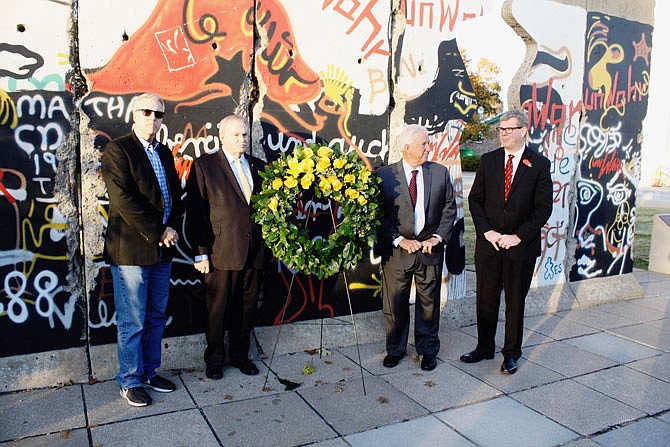The man behind former President Ronald Reagan's famous "tear down this wall" line faced many barriers trying to bring the speech to life.
Former White House presidential speechwriter Peter Robinson lectured Thursday evening at Westminster College to commemorate the 30-year anniversary of the Berlin Wall's fall. Robinson visited the Church of St. Mary the Virgin, Aldermanbury, to recount the history of how the speech came to fruition and how it almost didn't happen.
"We want to remember those who lost their lives trying to escape from the oppression of East Germany to the west who were not able to break through this formidable barrier as we can so freely today," said Tim Riley, Sandra L. and Monroe E. Trout director and chief curator at the National Churchill Museum.
Robinson explained at 30 years old, the speechwriting job he landed at the White House was the first full-time job he had ever worked. He began as then-Vice President George H.W. Bush's speechwriter and was soon reassigned to Reagan.
In April 1987, Berlin was celebrating its 750th anniversary, and President Reagan was invited by West Germany to offset the presence of Soviet Union leader Mikhail Gorbachev. Robinson was assigned a vague task to write a speech for the president while he visited Berlin.
"Here's what I was told by the (White House) senior staff: 'Here's where the president is going to stand, he'll have an audience of 10,000-40,000 in front of him, he will speak for 30 minutes and he ought to talk about foreign policy,' that was it," Robinson said.
Robinson elected to go to Berlin in advance to get an idea of how he should tailor the speech. During his stay, he said four distinct events shaped the way he wrote the speech.
The first event was seeing the Berlin Wall with his own eyes and witnessing the vast contrast between East and West Berlin. Second, he was influenced by John Kornblum, the United States minister and deputy commandant in Berlin, who outlined to Robinson the things Reagan should not address in his speech.
"He told me, 'Don't have him sound like an anti-communist cowboy, no Soviet bashing and don't make a big deal about the wall - they've gotten used to it now,'" Robinson said.
Next, he got an even clearer perspective of the contrast between East and West Berlin when he took a helicopter ride over the separation wall. He said the West Berlin side was a "modern, bustling city" while he only saw barbed wire and guard towers on the other side.
The fourth event that heavily influenced the direction of the president's speech happened while at dinner with notable West Germans. When he asked them to confirm if West Germans have "gotten used to" the wall, he said he was met with silence.
"One man raised his arm and pointed and said, 'My sister lives just a few kilometers in that direction, but I haven't seen her in more than 20 years. How do you think we feel about this wall?'" Robinson recounted.
Deeply moved by this fourth event, Robinson returned to Washington, D.C., and developed his first draft of the speech. The focal point was, "Tear down this wall." Knowing how the revision process worked, he said he and other speechwriters elected to not pass the speech through the chain of command, fearing it would be edited heavily or flat-out rejected.
Before Reagan departed for Europe, Robinson was able to get the unedited speech to the president. He said once White House officials got their eyes on the speech, his work was met with heavy reluctance and many objections.
"The (U.S. State Department) and the National Security Council fought it. They said it would raise false expectations, it sounded un-presidential and it would put Gorbachev in a difficult position. They submitted seven alternative drafts," Robinson said.
He said the opposition became so fierce he found himself in a shouting match with National Security Advisor Colin Powell after refusing to redraft the speech. Ultimately, the decision was left up to Reagan, who was in favor of Robinson's draft. He quipped to those opposed, "I'm the president, aren't I?"
Ultimately, the parties compromised, making tweaks for diplomacy's sake. Robinson refers to them as the "boring parts" of the speech.
"A memorandum from the National Security Council to Colin Powell read, 'The Brandenburg Gate speech is better than before, but the staff is still unanimous that it's a mediocre speech and a missed opportunity,'" Robinson quoted.
"I don't want to suggest that I'm the type of person that holds grudges for 30 years, but there are words that come to mind that I should not use in a church."

